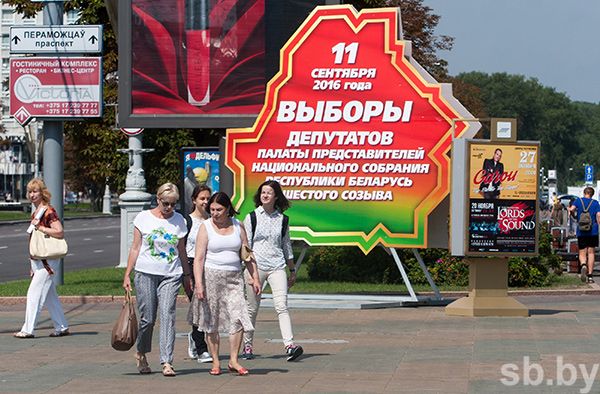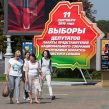
Killing the Messenger: The Demise of a Reliable Belarusian Pollster
Publication: Eurasia Daily Monitor Volume: 13 Issue: 143
By:

Dedicated Belarus watchers are almost certainly bemoaning the recent termination of a reputable non-state polling firm, the Independent Institute for Socio-Economic and Political Studies (IISEPS) (Belapan, August 9). Founded in 1992 by Oleg Manaev, a sociology professor at the Belarusian State University (BSU), IISEPS conducted quarterly surveys on the basis of representative national samples of 1,500 respondents and dutifully published the survey results. Because certain questions—for example, regarding the approval rating of President Alyaksandr Lukashenka, Belarusians’ geopolitical orientation, their perception of the economic situation, and attitudes toward foreign countries—were included in IISEPS’ questionnaires repeatedly and over a long period of time, the survey results allowed scholars to track long-term trends. And since the country’s state-run sociological centers never published regular (or at times any) polling results that would be both informative and comparable across time, IISEPS’s niche was unique in Belarus.
Since this pollster was not accountable to the government, IISEPS was harassed by the authorities on multiple occasions. Notably, the Supreme Court of Belarus ruled, on April 15, 2005, to close down the organization. Subsequently, IISEPS registered in neighboring Lithuania but continued its polling in Belarus. Even after a clause banning illegal surveys of public opinion was added to the Code of Administrative Violations in 2013 (Belapan, August 9), IISEPS’ polling did not stop. However, it had no choice but to come to a halt after a documentary titled “Primat NISEPI” (“Primate IISEPS”) was aired by Belarusian TV on July 31. According to the documentary, several stacks of documents were delivered by an anonymous associate of IISEPS “to journalists,” suggesting that instead of actually surveying Belarusians, IISEPS has been fabricating the results. Some members of the surveyors’ network denied on camera that they ever worked for IISEPS. With a haunted expression on his face, Yevgenii Kovalev, in charge of the entire network of IISEPS pollsters, revealed that the survey results had been “tailored to the desires of IISEPS’ donors” (Belteleradio, July 31).
Manaev, the polling organization’s founder, alleges that Kovalev’s pivotal televised confession was made under threat of criminal persecution (for illegal polling and for tax evasion) (Belapan, August 9). If true, this would hardly be surprising. But even if not, taking Kovalev’s confession entirely at face value is next to impossible. After all, IISEPS’ donors are Western organizations, so what, if anything, could be so much to their liking in IISEPS’ published polling results? For example, according to years of IISEPS’ surveys of the Belarusian population, Russia has steadily been Belarus’s best friend and Russians the culturally closest community. Moreover, IISEPS’ polling data indicates that Belarusians with a preference for state paternalism vastly outnumber those favoring the free market. Additionally, it would be difficult to understand why Western donors might be gratified to see that IISEPS has consistently reported that Belarusians lean more favorably toward the Russia-centered Eurasian Union versus the European Union; that the pro-Western Belarusian opposition has an abysmally low rating, while Lukashenka has enjoyed decent popular support most of the time; that most Belarusians are against Western sanctions; that they share the popular Russian attitude to the conflict in Ukraine; and finally, that Lukashenka did in fact win all his elections (that is, not just the 1994 election, but also in 2001, 2006 and 2010), albeit less overwhelmingly than reflected in the official results.
The authorities have routinely ascribed ominous designs to IISEPS’ foreign donors—i.e., a purported goal to wrest Belarus out of Russia’s sphere of influence and to undermine the ruling “regime” in Minsk. But the aforementioned survey results routinely presented by the independent polling group would hardly please such donors. Perhaps a discrepancy between Lukashenka’s official and actual electoral outcomes (for example, 83 percent of the popular vote in 2015 according to the state electoral commission, versus 58 percent as calculated by IISEPS) might alone suffice for IISEPS’ liquidation. But in fact, this polling data has not been used as a pretext for a legal crackdown in many years. On several occasions, this author asked IISEPS’ associates why they think they are still allowed to survey Belarusians. Invariably the answer was: If not us, who would speak the truth to “them?” Indeed, there were multiple indications that the authorities took guidance from IISEPS surveys, and the organization’s bulletins have been available in the National Library in Minsk.
Then, what prompted this most “lethal” attack, which forced IISEPS to terminate its polling activity so as not to subject the members of its interviewing network to criminal charges? Two distinct theories exist. According to one, Minsk desires a rapprochement with the West for economic reasons, but it does not want to change its political ways. Because the European Union considers the upcoming parliamentary elections the touchstone for its future Belarus policy, the authorities are worried that the next IISEPS survey may compromise Minsk in the eyes of the West (Naviny.by, August 7). According to the second theory, the termination of IISEPS was spearheaded by domestic forces ever hostile to Belarus’s rapprochement with the West. Often they emerge victorious. Who exactly personifies this specific “victory” remains unknown (Drakakhrust, August 4). While both theories make sense, the former is less believable because the format of a national poll is not conducive to uncovering voting irregularities under a proportional electoral system, which exists in Belarus.
Be that as it may, the termination of IISEPS is no sad event for two groups of people: those in the corridors of power who engineered the crackdown, and those with a hawkish point of view on official Minsk. “I told you so,” say some of the latter. Others, like the splinter group of the Popular Front still headed by Zianon Pazniak, who left Belarus in 1996, are openly gloating and publishing Manaev’s caricature in a KGB uniform (Narodnaya Peramoha, August 3). To them, discovering that the general public in Belarus does not actually hold the opposition in high regard is anathema. “Killing the messenger” is what they long wanted.
The closure of a reputable and unique polling agency is a sad event for impartial Belarus-watchers and for those of dovish orientation who have long appealed to Western decision-makers to jettison clichés and recognize the specific circumstances and interests of Belarus that its government reflects and articulates. Hence, a well-worn saying best encapsulates the essence of what happened: It is more than a crime, it is a mistake.




